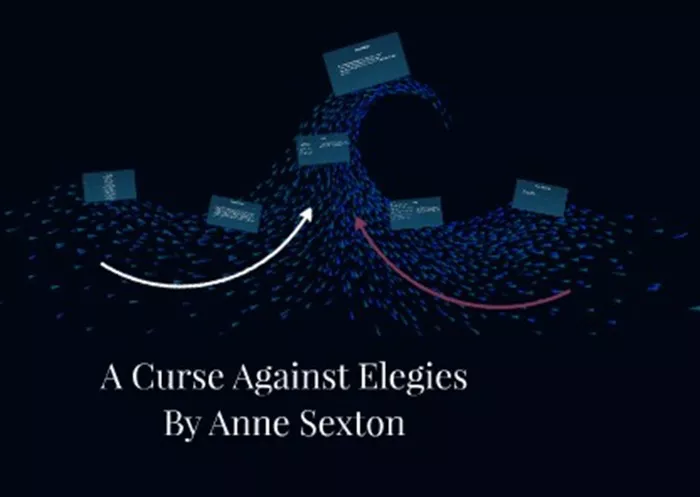Welcome to Poem of the Day – A Curse against Elegies by Anne Sexton
Anne Sexton was one of the most powerful voices in 20th-century American poetry. Known for her confessional style, Sexton often wrote about mental illness, family, death, and womanhood. Her poems are personal, emotional, and brave. She used poetry to explore her deepest thoughts and feelings, and she invited readers to do the same.
One of her most striking poems is A Curse against Elegies. In this poem, Sexton turns against traditional ways of grieving. She does not want sorrow to be dressed up in soft, polite words. Instead, she shows the raw pain of loss. Let us look at what this poem means and how it speaks to both grief and love.
A Curse against Elegies Explanation
What Is an Elegy?
Before we go into the poem, we should understand what an elegy is. An elegy is a poem that mourns the death of someone. It is often calm, reflective, and beautiful. Many poets have written elegies to honor the dead. These poems can bring comfort, but they may also hide the full truth of grief.
Anne Sexton rejects this idea. She curses the tradition of elegies. She wants something more honest, more human. She wants to show the anger and pain that comes with loss—not just the sadness.
Overview of the Poem
In A Curse against Elegies, Sexton speaks directly to a former lover. She is not mourning him in the usual way. Instead, she feels betrayed, abandoned, and wounded. The poem is personal, emotional, and filled with strong language. Sexton does not hold back. Her voice is fierce.
This is not a gentle poem. It is not a quiet goodbye. It is a cry from the heart, full of rage and sorrow. She wants the truth, not the polite lies people tell after someone is gone.
Themes in the Poem
1. Rejection of Traditional Grief
The poem’s title makes this clear. Sexton is cursing the idea of writing pretty, sad poems for the dead. She does not want to romanticize grief. She wants to speak honestly about pain. In her view, elegies are too clean. Real grief is messy. It does not rhyme. It does not follow rules.
2. Love and Betrayal
The speaker in the poem is mourning a lost love. But she is also angry. The person she loved has left her. She feels forgotten. She accuses him of turning his back on her. This is not the grief of someone who loses a friend to illness or age. This is the grief of someone who feels abandoned.
3. The Power of the Voice
Sexton uses her voice to fight back. She refuses to be silent. The poem becomes a kind of weapon. Her words are sharp. She curses. She cries out. She does not want pity. She wants to be heard. This is one of the most powerful parts of the poem—the speaker takes control of her story.
Tone and Language
The tone of the poem is raw and intense. Sexton uses direct, sometimes harsh, language. She is not trying to comfort the reader. She is telling the truth, even if it hurts.
The poem is filled with emotion. You can feel the speaker’s pain, her anger, and her loneliness. There is also love in the poem—deep love—but it is twisted by betrayal. Sexton’s language makes this clear.
She writes in simple phrases, but they carry deep weight. The words are not flowery. They are real. This is one reason why the poem is so powerful.
Form and Structure
The poem does not follow a strict form. It is free verse. This means it does not rhyme or follow a fixed meter. This choice matches the content. The speaker is breaking rules—just like the poem does. The structure reflects her feelings. She is not calm, so the poem is not calm.
There are short lines and strong pauses. This creates a broken rhythm. It mirrors the broken heart of the speaker.
Why This Poem Matters Today
Even though A Curse against Elegies was written decades ago, it still feels fresh. Many people struggle with grief. Many feel angry when someone they love leaves them. Sexton gives a voice to those feelings. She shows that it is okay to be messy. It is okay to scream. Grief does not always look like a sad, quiet poem. Sometimes it looks like this one—wild and honest.
In a world that often tells us to “stay strong” or “move on,” Sexton reminds us that real emotions are not always neat. This poem gives people permission to feel fully.
Conclusion
Anne Sexton’s A Curse against Elegies is a bold and unflinching poem. It rejects polite mourning and demands honesty. It shows grief not as soft sorrow, but as sharp pain. It speaks for those who are angry, confused, and hurt by loss.
This poem is not easy to read. But it is important. It teaches us that not all grief looks the same. And it reminds us that poetry can be a powerful tool for telling the truth—even when the truth is hard.
Sexton’s voice continues to echo, helping us feel and understand. That is the true power of her poetry.

